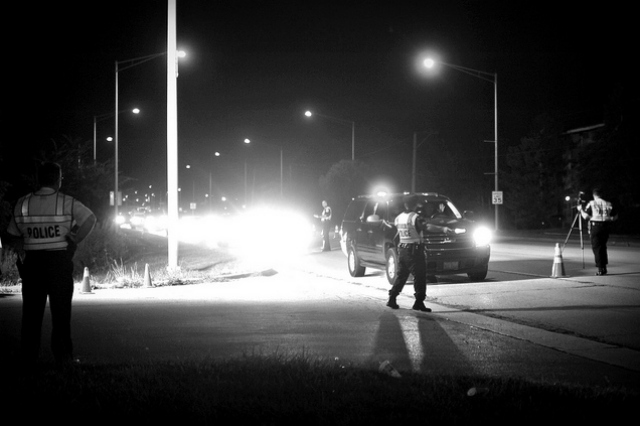Investigation Shows CPD Targets Black And Latino Neighborhoods For DUI Checks
By Rachel Cromidas in News on May 8, 2015 4:05PM
To combat the city's drunk driving problem, police have long used Driving Under the Influence Checkpoints stationed around the city on weekend nights to catch intoxicated drivers.
But the police department's DUI checkpoints frequently target the city's predominantly black and Latino neighborhoods while leaving certain other neighborhoods alone, according to a Chicago Tribune analysis of police data.
The Tribune's investigation found that 84 percent of Chicago's roadside checks were slated for black and Latino neighborhoods, while predominantly white communities were rarely checked, if ever, even when they have significant DUI rates. Jefferson Park, the Northwest Side neighborhood that is home to about one-fifth of the police force and their families, for example, has one of the city's highest DUI accident and fatality rates, but hasn't been visited by a CPD DUI checkpoint in over five years.
In comparison, Austin on the West Side has had 10 roadside checks scheduled in five years.
The roadside DUI checks are typically conducted at a pre-determined street corner in a police district overnight on Friday or Saturday nights. While the police sometimes target nightlife-heavy neighborhoods such as Lakeview and Wicker Park, they also often post up around sleepier neighborhoods. According to the investigation, only 4 percent of those checkpoints have been in police districts with mostly white residents.
Often, those checkpoints are catching few drunk drivers, if any, in a night. Instead, they are handing out dozens tickets for minor safety violations, such as failure to wear a seat belt, mostly to minorities. It's also an opportunity for officers to run names and license plates to check drivers for arrest warrants and evidence that they could be driving a stolen vehicle.
If the police department's policy for where to set up roadside checks is discriminatory, it could pose a big legal issue:
A pattern of setting up roadside checks along racial lines, experts say, raises concerns that police could be using the special patrols as a pretext to stop people in certain neighborhoods, which is a potential violation of the equal protection clause of the Constitution's 14th Amendment and unreasonable search and seizure prohibitions under the Fourth Amendment.
The department has argued that its checkpoint system is meant to protect citizens from dangerous DUI offenders. The ability to issue additional citations and check drivers for other signs of criminal activity is an added benefit, but not a goal. But the starkness of some of the data is hard to ignore.
The predominantly black Grand Crossing police district on the South Side is one of two police districts that has had the most DUI checkpoints. It also ranks No. 1 for the community with the fewest drunk driving accidents in Chicago. While the accident numbers could mean the frequent roadside checks are keeping the neighborhood safer, they could also mean police are targeting the wrong places.
